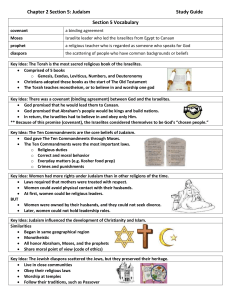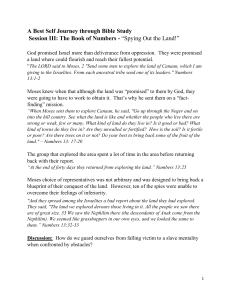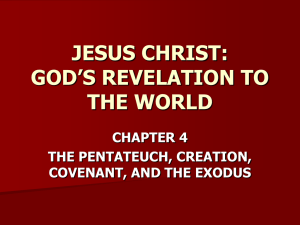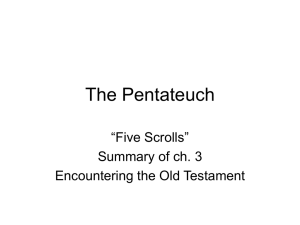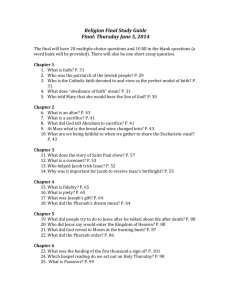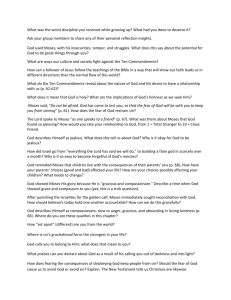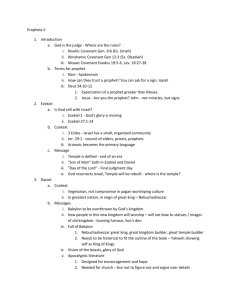Chapter 4 Review: The Naming of God and Ethics Definitions God`s
advertisement
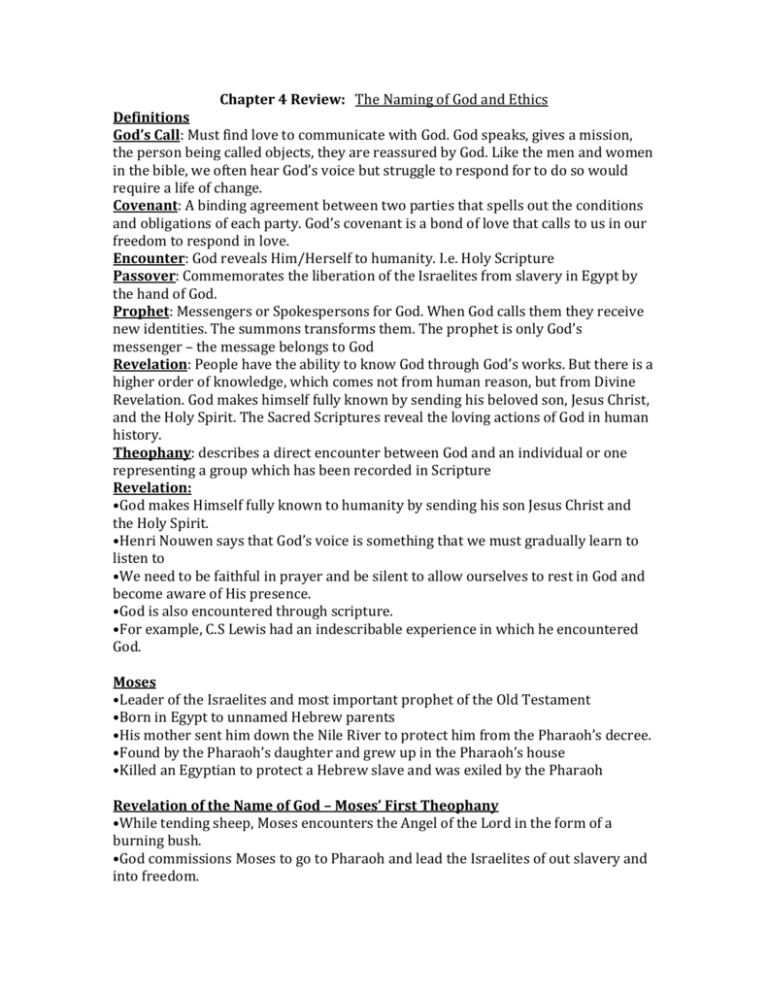
Chapter 4 Review: The Naming of God and Ethics Definitions God’s Call: Must find love to communicate with God. God speaks, gives a mission, the person being called objects, they are reassured by God. Like the men and women in the bible, we often hear God’s voice but struggle to respond for to do so would require a life of change. Covenant: A binding agreement between two parties that spells out the conditions and obligations of each party. God’s covenant is a bond of love that calls to us in our freedom to respond in love. Encounter: God reveals Him/Herself to humanity. I.e. Holy Scripture Passover: Commemorates the liberation of the Israelites from slavery in Egypt by the hand of God. Prophet: Messengers or Spokespersons for God. When God calls them they receive new identities. The summons transforms them. The prophet is only God’s messenger – the message belongs to God Revelation: People have the ability to know God through God’s works. But there is a higher order of knowledge, which comes not from human reason, but from Divine Revelation. God makes himself fully known by sending his beloved son, Jesus Christ, and the Holy Spirit. The Sacred Scriptures reveal the loving actions of God in human history. Theophany: describes a direct encounter between God and an individual or one representing a group which has been recorded in Scripture Revelation: •God makes Himself fully known to humanity by sending his son Jesus Christ and the Holy Spirit. •Henri Nouwen says that God’s voice is something that we must gradually learn to listen to •We need to be faithful in prayer and be silent to allow ourselves to rest in God and become aware of His presence. •God is also encountered through scripture. •For example, C.S Lewis had an indescribable experience in which he encountered God. Moses •Leader of the Israelites and most important prophet of the Old Testament •Born in Egypt to unnamed Hebrew parents •His mother sent him down the Nile River to protect him from the Pharaoh’s decree. •Found by the Pharaoh’s daughter and grew up in the Pharaoh’s house •Killed an Egyptian to protect a Hebrew slave and was exiled by the Pharaoh Revelation of the Name of God – Moses’ First Theophany •While tending sheep, Moses encounters the Angel of the Lord in the form of a burning bush. •God commissions Moses to go to Pharaoh and lead the Israelites of out slavery and into freedom. •When Moses asks what he should tell the Israelites when they ask who sent him, God responds by telling Moses his name, “I am who I am” •Moses is reluctant to accept God’s mission and insists that God has chosen the wrong person •God reassures Moses by telling him what to say to his people and has Moses’ brother Aaron act as a mouthpiece. Moses’ Mission •Moses goes to the people and with Aaron’s help convinces the Israelites that they were sent by God. •Pharaoh refuses to allow the Israelites to leave so God sends the ten plagues to Egypt: 1. Water Turned to Blood 2. Frogs 3. Gnats 4. Flies 5. Livestock Diseased 6. Boils 7. Thunder and Hail 8. Locusts 9. Darkness 10. Death of the Firstborn The Egyptians tried once more to hold the Israelites in slavery. However, they escaped after the parting of the Red Sea. Israel at Mt. Sinai •Moses went back up to God and He told Moses that if the Israelites upheld the covenant, they would be a priestly nation and would be his treasured possessions out of all people •The Lord then told Moses to consecrate his people, have them wash their clothes and prepare for the third day when He would descend upon Mt. Sinai •On the morning of the third day a trumpet sounded and there was thunder and lightning. Then the mountain was wrapped in smoke as the Lord descended upon it in fire. The Decalogue •Then God gave Moses the Ten Commandments/The Decalogue •These were the guidelines of what was expected of the Israelites and the conditions that must be met in order to uphold the covenant between them and God. •After all the people witnessed the thunder and lightning; they were frightened of the Lord and feared for their lives. However Moses reassured them and said “Do not be afraid; for God has come only to test you and to put the fear of him upon you so that you do not sin.” (Exodus 20) Guiding Questions - Pg 65 What happened to C.S Lewis in his experience? In this experience C.S Lewis had a revelation with God. He notes that the experience was almost beyond words and has difficulty explaining exactly what happened. Before the experience, Lewis says he was wearing stiff clothing, which refers to feeling of isolation, guilt and a lack of freedom. He is given the choice by God to experience true freedom. After the experience Lewis says that he began to open his eyes and ears to see what was presenting itself in his everyday life. How did this encounter with God being to change C.S Lewis? Lewis begins to change as a person after the experience. He begins to open himself to God and in a gradual process, begins to see and hear God in his everyday life. Lewis also makes the discovery, “I am what I do”. He then advises people to resist our culture’s tendency to be sceptical and instead learn to listen. The Ten Commandments The Ten Commandments have been interpreted in the traditionally known Catechetical texts. (Ex. “I am the Lord your God who brought you out of the land of Egypt out of the house of Bondage” is the same as “I am the Lord your God” in Traditional Catechetical sense) There are two versions of the Ten Commandments found in the bible. One is the Exodus 20, which is the longer version and the second version Is in the Book of Deuteronomy Not intended just for the Jews Addresses each and every one of us individually. The “you” in the Commandments is in the second person (and therefore, singular) for the simple fact so that it can be relevant to what it means to you as an individual States and explains to us what God's expectations are for us outlined through our covenant between God Jesus was asked by one of his followers which Commandment was the most important. Jesus answered the first as it is to Love your Lord they God with all you heart mind and soul. The second greatest is to love thy neighbour as yourself. These two Commandments are the foundation all the rest of the Commandments lay on. Ten Commandments are the Law and Covenant to the people of God; this makes it not just rules and commandments, to remind us of what the Lord did especially to the children (people) of Israel. The Second part of the Commandments it shows and describes how to treat God and by treating our neighbours with Love and compassion we are also giving this love and respect to God as well. Jesus has taught us that the first three Commandments hold the key to Love and honour God. The last seven helps us with the human community we live in. The covenant between the people of Israel and God brought them out of slavery. The Lord chose them because they cried out to him to help them; all he asks in return is to Love him and abide by the Law of the Ten Commandments. Covenant- In order to understand Covenants we must take a look at their origins: The Preamble The treaty always begins with the name, the titles and attributes The Historical Prologue The Leader gives a historical overview which describes the relationship between the Leader and what is expected from the one entering into the covenant. It includes the benefits if followed The prologue forms the foundation It can be said many ways depending on the circumstances at the time of the treaty. The Submission The submission states what is expected It declares future relationship of the partnership Requests Loyalty It is expressed frequently for example- “Love thy God-I am your God” The Witnesses Every document needs a witness Treaties and covenants Witnesses can be God, Moses, people, prophets heaven, earth and so forth The Blessings and Curses The treaty or covenant explains what will happen if you remain faithful or unfaithful What's in a Name? Your name is who you are This is your identity which you were given at birth by your parents Like the story of the burning bush, Moses is given a new name for God; YHWH The Name “I AM” who is God has consequences for Moses: It changes his life forever because it has given Moses a mission and part of this mission is the name “I AM” “I AM” is who will free the Israelites The name “I AM” in this case is the liberator who frees them When Moses is called by “I AM' from the bush, Moses answers, “Here I Am” Moses has now declared his call as a prophet to God As a prophet his name has now given new meaning and identity and as a witness of God Information is now given to us about God through Moses because of the “I AM” name “I AM' or YHWH is a name with great power which changes history forever: The slave people become a nation by this great power of this name Therefore, now the nation Israel has been given a vocation The Israelites are now bound forever to reveal this name. There can never be an Israel without “I AM” The Name now results in a very new way of living: The name is now an ethical event The most important part of the meeting between God and Moses is the Ten Commandments that were given to him by “I AM” The reason for keeping these commands is that “I AM” is your GOD; this covenant is an ethical bond between God and the people It is in obeying these Ten Commandments that we actually give witness ourselves to God The name is not something we can understand by name only, but rather acting ethically towards the other is what gives us the knowledge of what the name means. We are agents of God therefore and need to act responsibly for the other. The Name is a source of judgment: When you hear the name God it provokes a decision on who ever hears it The Name can not only be a blessing, but it can also be a curse For example, the Name “I AM” became a curse for Egypt as when the people decided not to abide by HIS covenant it was cursed Life as a covenant with YHWH The book of Exodus explains to us all how the people of Israel began to understand that they were the people of God Their stories became our stories , making us understand ourselves as people of God today Even in today's society we understand that this applies to all nations not just Israel and that this covenant with God makes us responsible now to others There are many stories in the bible we can read that has the same universal meaning for example stories such as the creation, faiths of the Israelite, Moses and so forth All these stories unite us together with our relationship to God We were never meant to be alone but with each-other Just like the creation of the story regarding Adam when God created him he saw that he was alone and then created Eve The story of Abraham and Sarah says that all nations were to be blessed and through him all nations would be born. His faith helps him leave his homeland on the blind faith based on a promise from God, to find the new land. Like Abraham, we too must have faith in God and each other so that our relationship with God is made into an unbreakable bond and trust. The Covenant with Moses It is when Moses encounters God in the burning Bush that the covenant was made Because Abraham (Moses) and this bond with God and heard the cry of his people he came to help them God was very moved from their suffering and their faith and cry to Him. “I am” also made a covenant to search for Israel’s heart and the bond is everlasting If Israel forgets this bond or ignores it then they will be lost As Christians we understand this theory because we too can be lost without abiding to the covenant with God Our covenant is continuously renewed and becomes more powerful through Jesus It is this identity that has been rooted in God and through our relationship with Jesus Christ Prophets of God Moses is not the only prophet; Israel’s history contains several prophets When God calls a prophet, they receive new identities; it transforms them The call from God defines a person’s vocation; our personal way of life The prophet’s vocation defined who they became Structure of a Call Story 1. Confrontation with God: Each call story begins with an encounter with God that is always unique. We recognize the immense disproportion between God and the prophet. God sends them on their mission that completely changes their life. 2. Introductory Speech: God always speaks first and makes himself announced. The heart of the call is an assurance that God is with the prophet. 3. Imparting of a mission: Sometimes the mission is brutal and takes on identity/ mission of the prophet. This is the prominent phase of the story 4. Objection by the prophet-to-be: Prophets are strongly aware of the mission and know it will set them apart from people. It is their burden, but God is with them. 5. Reassurance by God: God reassures the prophet that they will succeed in their mission. Words the prophet speaks are God’s word; the prophet is taken over by the lord’s word. 6. The Sign: Delivering on promise; not always a clear sign The Structure of Isaiah’s Call: 1. Saw lord sitting on throne; hems of robe filled the temple; seraphs in attendance (6wings) 2. “Holy, holy, holy is the lord of hosts; the whole earth is full of his glory “(God) 3. Whom shall I send? His mission is preceeded by a request. 4. His unclean lips 5. Seraph touches his lips, cleans away sins and doubts 6. “Until cities lie waster...when it is felled” (bring upon themselves) Babylonian exile The Structure of Jeremiah’s Call: 1. Lord came to him (in which form is undefined) 2. 3. 4. 5. 6. “Before I formed you I knew you” Prophet to the nation Jeremiah felt that he was only a boy God put his words in Jeremiah’s mouth “To pluck up and pull down ... to build and to plant” The Structure of Ezekiel’s Call: 1. Vision 2. “ O mortal, stand up I will speak with you 3. Sent to Israel who has rebelled against God 4. Ezekiel stubborn, doesn’t say anything; stunned for seven days 5. Eats scroll to fill stomach/soul 6. Lifted up ; glory of Lord rose in his place Prophets of Judgement A prophet is given a mission to tell the people that their cities will be laid waste of inhabitants etc is given a bitter/difficult mission The prophets are ordinary people and yet they are called to being judgement over God’s people The prophets are expressing God’s action to keep the covenant from unravelling Past tragedies of Israel need to be understood in terms of the covenant Not to symbolize end of covenant, but rather the need to embrace it In times of misery, it is the prophet’s job to interpret the significance of the events; recognizing that freedom involved realizing sinfulness Sin and Transgression Sin was a word used by the prophets to mean transgressions; events judged by God Realizing that our actions do not measure up before God; no one is as holy as God Breaking the commandments is sinful because we wilfully distance ourselves from God; breaks our covenant with God and one another Sin shows itself when moral commandments are broken; sins turn us away from God The prophets broke down the infractions of sinning; you are a sinner by stealing, killing, polluting etc. Sins reveal the holiness of God Guiding Questions – pg 81 & 82 What does “Revelation” mean in the context of sacred Scripture? God makes Himself fully known to humanity by sending his son Jesus Christ and the Holy Spirit. The Sacred Scriptures reveal the loving actions of God in human history. Why does the Revelation of God always call us to respond in some way? God’s revelation demands a response. What is Israel’s understanding of sin? Sin is seen through the eyes of Israel as a transgression against God. By sinning we distance ourselves from God, breaking moral commandments (Ex. 10 commandments) How is God’s action of sending prophets to point out Israel’s sin a loving and constructive thing to do? By sending prophets, God allows the Israelites to recognize their the immorality of their action. This is especially true in comparison to God’s holiest of actions. This comparison reveals the Israelites’ sins. How do you think that sending prophets to the people is God’s way of keeping the covenant relationship intact? Prophets are a vessel for God’s voice. By sending them to the people, God is able to show us our faults when we stray from the covenant. God’s prophets bring his judgement and allow us to recognize our captivity to sin.
